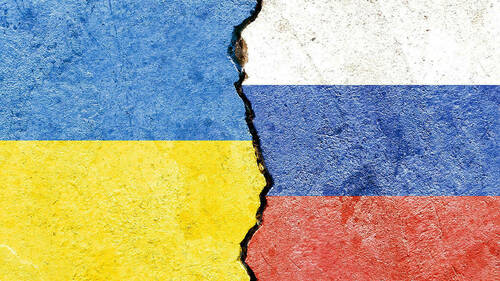
On Tuesday (Feb. 1), Russian President Vladimir Putin said the United States and NATO have ignored Russia’s top security concerns as he addressed tensions with the West for the first time this year, stating the U.S. is trying to provoke Russia into an armed conflict as a reason to impose tougher sanctions.
During a news conference following a lengthy meeting with Hungarian Prime Minister Viktor Orban, Putin said Russia is analyzing U.S. and NATO replies to its proposals and reiterated Russia’s demands that the United States and NATO not expand their military alliance eastward. His comments — the first in over a month — come as more than 100,000 Russian troops are gathered around Ukraine’s borders and diplomatic activity strives to avert a renewed Russian invasion.
The Russia-Ukraine crisis began in earnest in 2014 when Russian troops took control of the Crimean peninsula, according to Mary Ellen O’Connell, the Robert and Marion Short Professor of Law and Research Professor of International Dispute Resolution at the Kroc Institute for International Peace Studies at the University of Notre Dame and author of “The Crisis in Ukraine—2014.”
O’Connell says Russia responded to legitimate concerns with major violations of international law in annexing Crimea and using force in Eastern Ukraine. Russia is now threatening further aggression against Ukraine. Defending Ukraine’s rights, however, requires strict adherence to the rule of law. It is counter-productive to try to defend legal rights by violating the law. Some of the sanctions the West is proposing would violate international law, as would offensive cyberattacks, she says.
“We have reached a moment to either support authentic legal principles or risk losing them altogether,” O’Connell warned in a blog post for the European Journal of International Law.
“The Russia-Ukraine crisis debate is being waged using legal concepts of statehood and principles governing the use of force and countermeasures,” O’Connell said. “We rarely hear mention of the other critically relevant area of law, the principles and procedures of international dispute resolution. Yet, those are the only game in town for this dispute.”
O’Connell says that the Russia-Ukraine dispute holds the potential for the use of nuclear weapons, but even a conventional clash between Russia and the United States could be devastating — not only in terms of lives lost but also for the world’s economy. Such a conflict would set back efforts requiring international cooperation from the challenge climate change to human rights atrocities. She says the situation calls for creative diplomacy.
“It will require diplomacy based on international law. Ukrainian officials speak of Ukraine’s right to independence and territorial integrity. They restate the prohibition on the use of military force and the Ukrainian right of self-defense. Russia speaks of an agreement reached in 1994, in which NATO members promised not to expand the alliance to the former Soviet Union and its sphere of influence. Ukraine has provided evidence to the United States that Russia planned a ‘false flag’ operation to create a legal basis for military force against Ukraine. Apparently, Russia cares enough about international law to possibly kill its own soldiers to create a self-defense justification.”
However, O’Connell says there is a way forward — one that engages negotiators with knowledge of what international law classically requires and what the institutions of international law offer.
She says the natural venue for talks is the Organization for Security and Cooperation in Europe (OSCE) based in Vienna. Negotiations should work to expand the existing Minsk II treaty reached among Russia, Ukraine, France and Germany in 2015.
“Minsk II has languished without sufficient support by the participants or the main non-participant — the United States,” O’Connell said. “Ukraine, the U.S., its allies and Russia can revisit the agreement and avoid war.
“The OSCE can take up its role of monitoring any new agreement, providing early warning of violations that will trigger sanctions,” she said. “Germany holds the key to the most important, lawful and effective sanction — cutting off natural gas purchases from Russia. President Obama should have insisted on this step in 2014 when Russia unlawfully took control of Crimea. Sacrifice then could well have avoided the far more dangerous situation the world faces today.”
Contact: Mary Ellen O’Connell, maryellenoconnell@nd.edu
